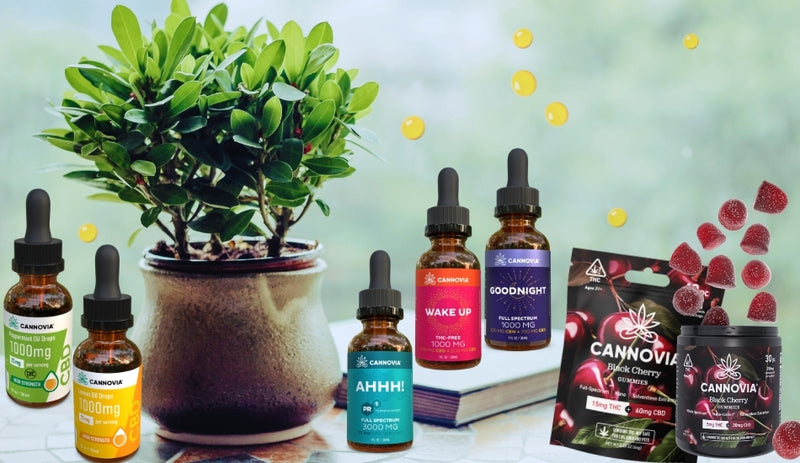CBD has been touted as a panacea for a variety of ailments, and with the
legal fight for recreational use of marijuana ongoing in Albany, New Yorkers may be looking to it as an alternative. But what it is and how to use it remain murky. And is it even legal in New York? Scroll down to find out.
What is CBD?
Cannabidiol (CBD) is a type of cannabinoid, or chemical compound found in the cannabis plant. Unlike tetrahydrocannabinol (THC), a cannabinoid in marijuana, CBD is not psychoactive and won't get you high. A number of products — oils, lotions, soaps and edible gummies — incorporate CBD, and it can be consumed via oral tinctures and vape cartridges.
Is CBD legal in New York?
With the passage of the Farm Bill in December 2018, which made hemp — a type of cannabis sativa plant with a THC concentration of .3 percent or less — legal in the United States, it is largely understood that CBD, extracted from hemp, also is legal across the country. “New York has maintained that CBD is legal,” said attorney Nikolas Komyati, the head of the cannabis group at Bressler, Amery & Ross. Under the Farm Bill, it also is legal to buy hemp-derived CBD online and ship it, said Jonathan Miller, the general counsel at the U.S. Hemp Roundtable. That legal status applies to CBD products that have a THC concentration of .3 percent or less. So how do consumers trust that their favored product adheres to the standard? One of the biggest challenges the nascent industry faces is proving how CBD has been extracted, as the product isn't regulated by any governmental entity. Increased interest in CBD-infused products, however, has spurred the Food and Drug admin2istration to schedule
a hearing on May 31 to discuss regulation. The U.S. Patent and Trademark Office
issued updated guidelines on May 3 on how it will handle trademarks for hemp and CBD goods and services. The agency explained that because of the Farm Bill, products with a THC concentration of .3 percent or less could be accepted for trademarks, but some products, like “food, beverages, dietary supplements or pet treats,” would still be refused because the FDA has not technically approved them yet.
What about food and drinks with CBD?
Though some bars and restaurants in the city have put CBD-infused items on their menus, New York has banned selling food and drinks with CBD. “The Health Department is currently educating food service establishments and retailers that CBD is prohibited from being added to food and drink, and to stop offering these products,” a
notice on the NYC department’s website says. Beginning in October, the health department will issue violations to establishments offering food or drinks containing CBD, the notice says. Once the FDA establishes a framework to regulate CBD products, New York’s position could change. “We think the ultimate outcome is that (the FDA is) going to permit CBD to be used as a dietary supplement or a food additive, but it will be regulated,” Miller said. “One possibility is that they’ll say that you’re only allowed to use a certain number of milligrams of CBD in a particular product.”
Where are CBD products sold in New York City?
CBD products are sold in health-food stores and smoke shops, as well as online. CVS has started selling CBD products in some states, but not in New York.
What are the health benefits of CBD?
CBD has been advertised as having a number of health and therapeutic benefits, but its effectiveness is still being researched. “It’s been investigated for treating all sorts of different conditions, from epilepsy to schizophrenia to arthritis to drug addiction to traumatic brain injury to Alzheimer’s to anxiety to PTSD,” said Dr. Esther Blessing, an assistant professor of psychiatry at NYU Langone Health. In “preclinical” studies, such as animal testing and human laboratory tests, CBD has shown to have positive effects. “It’s shown really promising properties, but that doesn’t necessarily mean it will definitely work in the actual final clinical trials,” Blessing said. For example, there haven’t been any completed clinical trials on CBD’s effect on anxiety, “but there have been these human laboratory studies where people just experimentally induce anxiety … and then they measure whether just a single dose of CBD could reduce that anxiety,” said Blessing, who is currently working on a clinical trial for CBD’s effect on PTSD. These studies have shown CBD reduces anxiety compared to a placebo, but “that’s not the same as saying that it would be effective if you gave it every day to a patient with anxiety,” Blessing explained, describing the studies as “a kind of preliminary form of evidence.” Clinical trials have been completed on the chemical’s treatment of two rare forms of childhood epilepsy, and, as a result, the FDA approved a CBD prescription called Epidiolex.
What to know before you buy CBD
If you are considering trying a CBD product, here are some factors to consider:
Be careful with drug-drug interactions CBD can interact with other medications, and the results can be dangerous, Blessing said. “If you start taking CBD and you’re on other medications, make sure you talk to your doctor about their potential interactions because they could be quite serious."
Be wary of the level of CBD in a product Companies may not be transparent about how much CBD is in their products, or what the source of the CBD is. “There’s all sorts of ways that businesses can approach this market and kind of take advantage of the consumer’s lack of understanding,” said Brian Baum, CEO of
CANNOVIA, a company that aims to educate consumers and provide access to quality CBD products. Even companies that are transparent likely don’t adhere to the same level of purity and standardization that’s being tested in clinical trials, Blessing said. Baum encouraged consumers to look for a "certificate of analysis," which is a lab test done by a third party that shows the levels of CBD, THC and contaminants in a certain batch of CBD.
Consider what type of product you're using Different types of products have different potencies of CBD, which impacts how much you should use. “Oral forms of CBD have much less bioavailability compared with if you smoked CBD or took it sublingually under the tongue, or rub it into the skin,” Blessing said. “When you take CBD orally, just because of the properties of the substance, only a very small proportion of the drug that you take orally actually makes it into the bloodstream ... because it gets metabolized by the liver,” she said. “But if you smoke CBD, then it doesn’t get metabolized by the liver, so it’s much more potent. It's also "somewhat more potent" when rubbed into skin.
Understand the difference between CBD and hemp seed oils While hemp seed oils can have health benefits, they do not contain CBD and don’t have the same benefits CBD can have. If consumers are searching for
CBD oils online, they could get confused when hemp seed oils show up in the results, Baum said. “If you’re a consumer and you’ve just heard from a friend or whatever that CBD did this for them, and then you go to Amazon (which does not sell CBD products) and search CBD oil, you’re gonna receive a lot of results, but those results are gonna be hemp seed oil,” he said.











